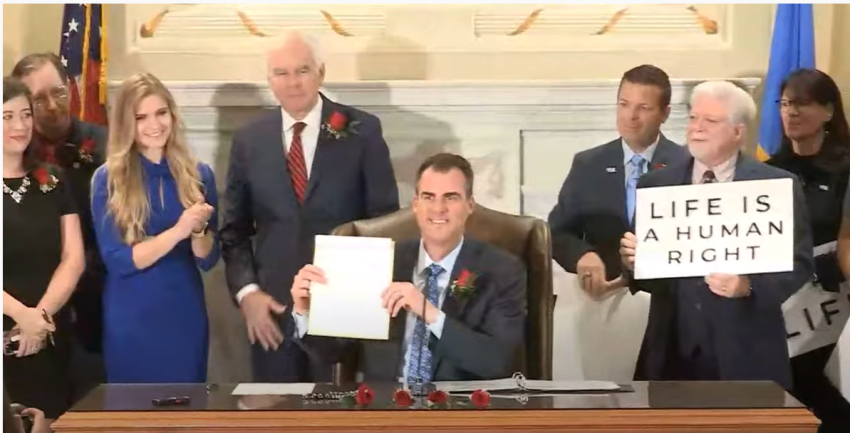Gov. Stitt signs law banning most abortions, seeks to make Oklahoma 'most pro-life state'

The governor of Oklahoma has signed a bill into law banning nearly all abortions in the state except when a mother's life is at risk in a medical emergency. Those who violate the law could face up to $100,000 in fines and 10 years in prison.
Oklahoma’s Republican Gov. Kevin Stitt signed Senate Bill 612 into law Tuesday, saying he aims to make the Sooner State “the most pro-life state in the country.”
Women who seek or obtain an illegal abortion wouldn't need to fear prosecution, as the law doesn't “authorize the charging or conviction of a woman with any criminal offense in the death of her unborn child.” It does not ban the use or sale of prescription contraceptives so long as the products are sold before a woman becomes pregnant.
The bill passed the state’s House of Representatives in a 70-14 vote last week, more than a year after it passed the state Senate in a 38-49 vote. In both chambers, one Republican joined Democrats in opposing the measure.
Stitt signed Senate Bill 612 into law Tuesday, as he was surrounded by pro-life activists, religious leaders and the bill’s sponsors in the state Legislature. The governor and those gathered around him were wearing red roses in honor of the Pro-Life Rose Day at the Capitol, an occasion sponsored by the pro-life group Oklahomans for Life, the Baptist General Convention, the Roman Catholic Archdiocese of Oklahoma City, and other churches and pregnancy resource centers.
“As governor, I represent all 4 million Oklahomans,” Stitt said at the signing ceremony. “They overwhelmingly support protecting life in the state of Oklahoma. We want Oklahoma to be the most pro-life state in the country. We want to outlaw abortion in the state of Oklahoma.”
The most important thing is to take a stand for the unborn and protect life.
— Governor Kevin Stitt (@GovStitt) April 12, 2022
Every life is precious.
As a father of six, that’s what I believe and I know that’s what Oklahomans believe. pic.twitter.com/VjmUz5QdOD
While he predicted that “this bill will be challenged immediately by liberal activists from the coasts who always seem to want to come in and dictate and mandate and challenge our way of life,” Stitt signed the bill nonetheless. Sharing his belief that “every life is precious,” Stitt declared that “the most important thing is to take a stand for the unborn and protect life.”
In a statement released Tuesday, Marjorie Dannenfelser of the pro-life group Susan B. Anthony List, praised Oklahoma for enacting “some of the nation’s strongest protections for unborn children and their mothers, which could save as many as 3,800 lives a year.”
The ACLU of Oklahoma had a different take on the bill, with Executive Director Tanya Cox-Toure declaring that “the only person who should have the power to decide whether you need an abortion is you — no matter where you live, or how much money you make.” She cited the enactment of the law as “a reminder of the immediate threat to our community’s health and reproductive freedom” that serves as a “placeholder to a rapidly approaching future without access to safe and legal abortion.”
“What politicians have done today is create a state where anybody who can become pregnant is forced to carry out a pregnancy against their will. We must continue to fight in the courts, in our state legislatures, in the streets, and at the ballot box to guarantee all people have access to the health care they need.”
The Oklahoma law represents a drastic contrast to a law recently approved by the governor in the neighboring state of Colorado.
Last week, the state’s Democratic Gov. Jared Polis signed into law a measure declaring that “a fertilized egg, embryo, or fetus does not have independent or derivative rights under the laws of this state.”
“A pregnant individual has a fundamental right to continue a pregnancy and give birth or to have an abortion and to make decisions about how to exercise that right,” the legislation added. “A public entity shall not … deprive, through prosecution, punishment, or other means, an individual of the individual’s right to act or refrain from acting during the individual’s own pregnancy based on the potential, actual, or perceived impact on the pregnancy, the pregnancy’s outcomes, or on the pregnant individual’s health.”
Pro-life laws passed by states like Oklahoma and the abortion laws passed by states like Colorado come as the United States Supreme Court is expected to rule on the constitutionality of Mississippi’s 15-week abortion ban. A ruling in favor of the state of Mississippi, which is asking the justices to uphold the ban, would weaken the precedent set by Roe v. Wade, the 1973 U.S. Supreme Court decision that legalized abortion nationwide.
Ryan Foley is a reporter for The Christian Post. He can be reached at: ryan.foley@christianpost.com



























